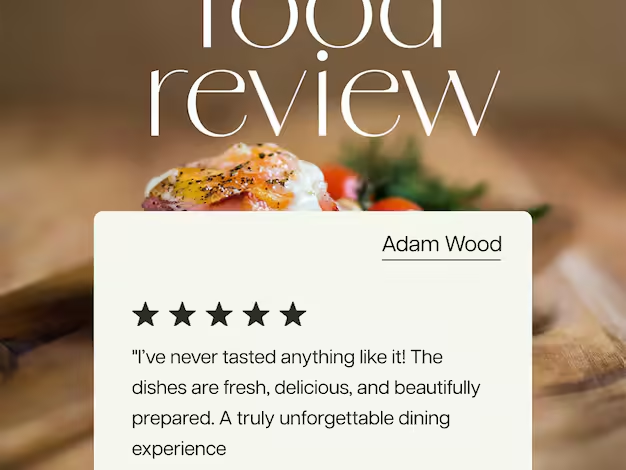The Power of Restaurant Reviews and How They Shape the Dining

Restaurant reviews have become a driving force in how people choose where to eat. Whether it’s a glowing piece from a food critic in a well-known magazine or a quick comment left on Google, reviews influence diners and shape the reputation of eateries. This post dives deep into the importance of restaurant reviews, their role in consumer decision-making, and how they impact restaurant success. You’ll also learn how to write compelling reviews and explore future trends for the evolving review landscape.
Why Restaurant Reviews Matter
Restaurant reviews hold incredible power in today’s dining culture. More than just a way to share thoughts on memorable (or not-so-memorable) meals, they serve as a key resource for diners seeking new cuisine and experiences. For restaurants, reviews can make or break their reputation, bringing in loyal customers or driving them away.
With billions of users visiting restaurant review platforms every month, such as Yelp, TripAdvisor, and Google Reviews, it’s clear that reviews form a vital link between restaurants and their potential patrons.
How Reviews Shape Consumer Decision-Making
When people search for a new restaurant to try, reviews are often one of the first things they check. Here’s why:
1. Building Trust Through Shared Experiences
Consumers view reviews as honest insights from others who’ve already experienced the restaurant. A well-written review, whether professional or user-generated, offers transparency and builds trust by shedding light on the quality of food, service, and ambiance.
2. Reducing the Risk of a Bad Experience
No one likes the idea of investing time and money into a disappointing meal. Detailed reviews act as guides, helping consumers make more informed decisions. For example, a review that raves about the handmade pasta at an Italian eatery but warns of the long wait times and loud setting helps diners set expectations.
3. Influencing Dietary or Lifestyle Choices
More customers are making dining decisions based on dietary needs or preferences, such as vegetarian, vegan, or gluten-free menus. Reviews that mention these details are particularly valuable to those with specific requirements.
Professional vs. User-Generated Reviews
Restaurant reviews come in two primary forms, and each plays a unique role in influencing customers.
Professional Reviews
These are crafted by trained critics who write for magazines, newspapers, or blogs. They often bring an expert perspective with detailed analysis of the food, plating, service, atmosphere, and more. These reviews carry significant weight and can elevate a restaurant’s profile almost overnight.
User-Generated Reviews
User reviews, written by everyday diners on platforms such as Google, Yelp, or social media, offer a more personal and relatable take on the restaurant. They’re abundant and often address specific details, making them a valuable resource for everyday decision-making.
What Matters More?
While professional reviews are respected for their authority, the volume and relatability of user-generated reviews have become equally influential in shaping public perception.
How to Write a Compelling Restaurant Review

If you’ve had an unforgettable meal—or an unforgettably bad one—you might feel inspired to share your experience. But crafting a restaurant reviews that resonates takes more than a few quick sentences. Follow these steps to make your review leave an impact:
- Set the Scene
Mention when and why you visited. Was this a casual Saturday dinner, a special occasion, or a quick lunch? Context sets the tone for readers.
- Discuss the Food
Highlight the dishes you ordered. Was the lasagna creamy with just the right balance of cheese and sauce? Did the tacos have fresh, zesty ingredients? Include sensory details to paint a picture.
- Rate the Service
Evaluate how attentive and friendly the staff were. Did they accommodate your dietary requests? Did they check on your table at appropriate times?
- Mention the Atmosphere
From intimate lighting to background music, the restaurant’s ambiance adds to the overall experience. Give readers a sense of what to expect.
- Be Honest but Fair
If it wasn’t the best meal you’ve had, share constructive feedback rather than tearing the place apart. Balance criticism with positive observations.
- Summarize Your Experience
Wrap up with an overall impression. Would you come back? Would you recommend it to others?
The Impact of Reviews on Restaurants
For restaurants, reviews are more than just feedback—they are business-critical. Here are a couple of real-life examples that illustrate how reviews can drastically change a restaurant’s prospects:
- Case Study 1: A small, family-owned diner in upstate New York saw a 200% increase in foot traffic after a local critic published a glowing review of their breakfast offerings in a regional magazine.
- Case Study 2: On the flip side, a new restaurant in Los Angeles received scathing reviews about slow service during its opening week, causing a significant dip in first-month sales. By responding constructively to reviews and addressing issues, they managed to recover and build a dedicated customer base.
SEO and Restaurant Review Websites
If you run or plan to develop a restaurant review website, check this out—SEO (Search Engine Optimization) can play a critical role in success. Target highly searched terms like “restaurant reviews near me” or “[City Name] best restaurants” to attract organic web traffic. Optimize individual posts with high-volume, specific keywords (e.g., “best vegan restaurant in NYC”).
Best Practices for Restaurants to Manage Online Reviews
For restaurants, reviews can’t be ignored. Here’s how they can effectively manage them:
- Respond to Reviews: Engage with both positive and negative reviews. Thank customers for good feedback and address concerns in a courteous manner when criticism arises.
- Encourage Reviews: Politely ask satisfied customers to leave reviews on platforms like Google or Yelp to build credibility.
- Monitor Regularly: Use tools like Google Alerts or review management software to keep track of new ratings.
The Future of Restaurant Reviews
Restaurant reviews will continue evolving with emerging trends, such as:
- Video Reviews: Platforms like TikTok are transforming how diners review restaurants with quick, digestible videos.
- AI-Powered Insights: Machine learning could soon analyze review trends and help restaurants identify patterns, such as menu items that consistently receive high praise.
- Hyperlocal Reviews: The focus may shift even more toward niche, neighborhood-specific review platforms for highly localized insights.
Transform Your Dining Experience Today
Restaurant reviews are critical in bridging the gap between diners and their next great meal. Whether you’re a casual foodie, a pro critic, or a restaurant owner, understanding and leveraging the importance of reviews is key to success in the dining world.
If you’ve found value in this post, why not try writing your own review of a recent meal? Your insights could help others discover their new favorite spot!
Meta Data
Meta title
Restaurant Reviews and Their Role in Dining Culture
Meta description
Dive into the power of restaurant reviews, their impact on customer decisions, and how they shape the dining scene. Learn to write reviews that influence!




